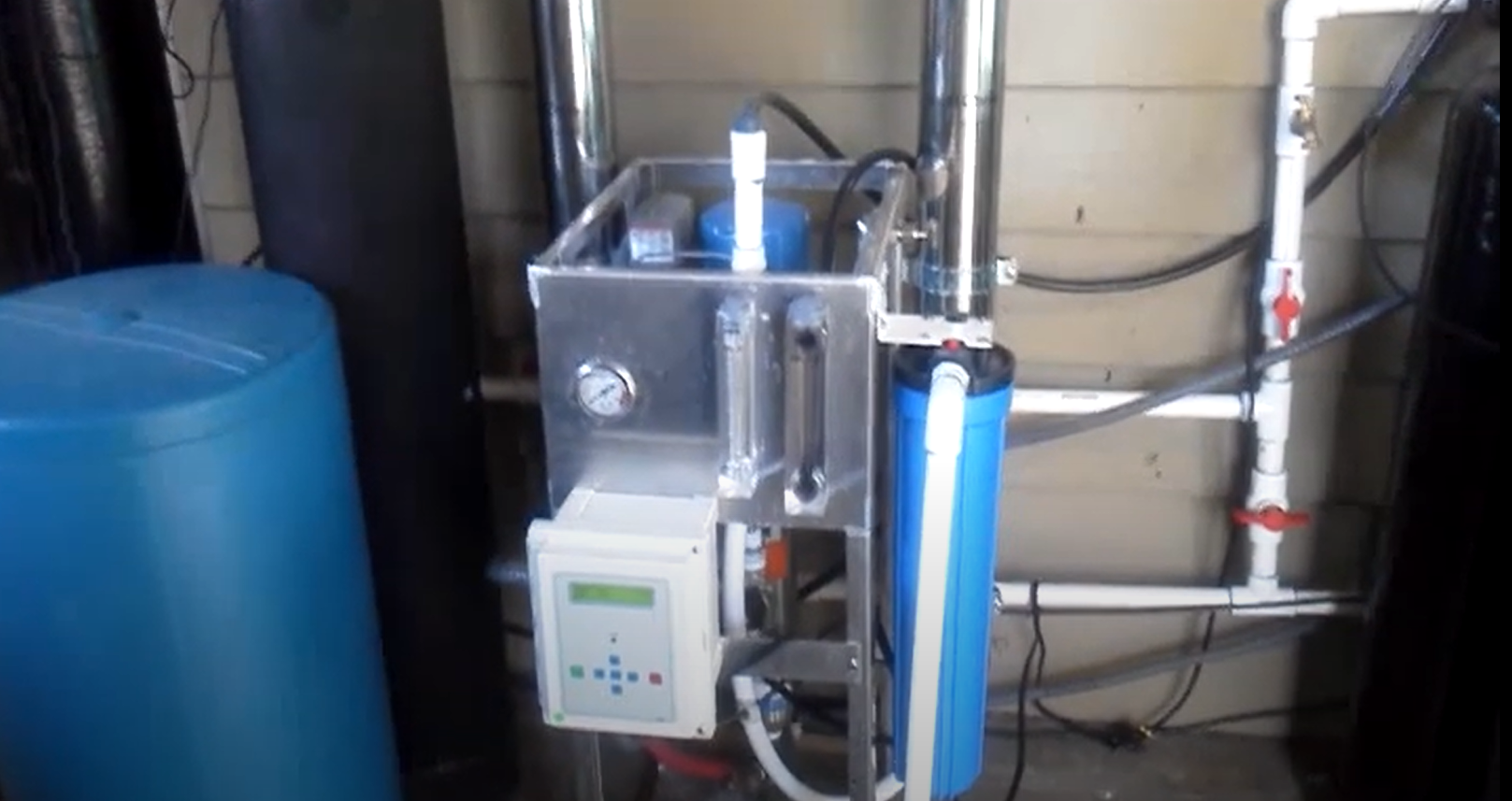The Benefits of Home Water Filtration Systems
A home water filtration system offers a defense against these invisible invaders, promising cleaner, tastier, and safer water. But the benefits go beyond purity. From cost savings to environmental impact, there’s a wide range of advantages to explore.
Let’s explore these layers together, and you’ll see why adding this system to your home might be the wisest decision for your health and wallet.
Key Takeaways
- Home water filtration systems improve water taste and odor, encouraging better hydration.
- They remove harmful contaminants, contributing to improved health and reduced waterborne diseases.
- A filtration system reduces plastic waste and carbon footprint, offering significant environmental benefits.
- Filtration systems can save costs by eliminating bottled water expenses and lowering plumbing repair needs.
What is a Water Filtration System, and How Does it Work?
A water filtration system is critical for purifying your home’s tap water. It employs various technologies to remove contaminants, making it safe and clean for drinking, cooking, and other uses.
These systems can vary widely in size, design, and filtration method, catering to different needs ranging from individual household use to municipal water treatment facilities.
The primary goal is to improve water quality by reducing pollutants such as bacteria, viruses, algae, fungi, minerals (like lead and mercury), particulates, and chemicals (like chlorine and pesticides).
The choice of a water filtration system depends on the water source’s specific contaminants and the finished water’s desired quality. For instance, while activated carbon filters are great for improving taste and removing certain chemicals, they may not remove all harmful organisms or chemical contaminants, so some households and facilities might opt for multi-stage systems incorporating several filtration types.
There are several common types of water filtration systems, each employing different technologies:
- Mechanical Filters – These remove sediments and particulates from water through a physical barrier, ranging from a simple mesh to more complex micron filters.
- Activated Carbon Filters—These systems use activated carbon to effectively remove organic compounds, chlorine, and its by-products, improving taste and odor.
- Reverse Osmosis (RO) Systems – RO systems use a semi-permeable membrane to remove a wide range of contaminants, including dissolved salts, bacteria, and viruses, making them one of the most effective household filtration systems.
- Ion Exchange Systems – These systems soften water by exchanging ions in the water with ions fixed to a resin. They are particularly useful for removing “hard” minerals like calcium and magnesium.
- Ultraviolet (UV) Filters – UV filtration uses ultraviolet light to kill or inactivate bacteria and viruses, providing microbiological purification without adding chemicals to the water.
- Distillation Systems – By boiling water and then condensing the steam back into water, distillation systems remove minerals, bacteria and viruses, and chemicals with a higher boiling point than water.
Understanding the Basics of Water Filtration Systems
It is essential to understand how water filtration systems work and how these systems employ various technologies to remove contaminants from water, making it safer and cleaner for consumption. A water filtration system passes water through one or more filters that trap contaminants, such as chemicals, heavy metals, and bacteria, ensuring the filtered water meets or exceeds water quality standards.
The benefits of a water filtration system extend beyond just cleaner water; they also include improved taste, reduced plumbing issues, and significant cost savings over bottled water. Expressly, a whole-house water filtration system guarantees that every water source in your home dispenses purified water, enhancing overall health and well-being.
This all-encompassing approach to water treatment highlights the vital role of water filtration systems in maintaining high water quality standards in residential settings.
The Step-by-Step Process of Filtering Tap Water
Understanding the detailed process through which tap water is filtered requires delving into the mechanics of water filtration systems, which employ a series of steps to remove impurities and guarantee the provision of clean, safe water for consumption.
Initially, your home water filtration system targets large particulate matter through a pre-filtration stage, basically safeguarding the finer filters downstream. Subsequently, the water passes through an activated carbon filter that removes chlorine, pesticides, and organic compounds. This stage greatly improves the water’s taste and smell.
The next pivotal phase might involve reverse osmosis or ion exchange, pinpointing and eliminating microscopic contaminants, and ensuring the filtered water tastes and smells better. This systematic approach to filtering tap water underscores water filters’ intricate yet efficient operation, spotlighting their critical role in enhancing water quality.
Different Types of Home Water Filters and Their Functions
Exploring the domain of home water filtration, it’s important to distinguish between the various types and their specific functions in purifying your water. When considering water filtration solutions, you’re likely to encounter:
- Whole-House Water Filtration System: This system filters the water entering your home, ensuring all water outlets dispense purified water. It’s ideal for thorough water filtration.
- Under-Sink Water Filters: These systems are installed under the sink and purify water simultaneously, making them suitable for drinking and cooking water.
- Countertop Water Filters: Easy to install, these filters connect to your faucet and provide immediate access to filtered water, perfect for renters or those seeking a temporary water filtration system.
Each home water filter system type is vital in delivering clean, safe water throughout your home.
Why Should You Consider Filtering Tap Water?
You should consider filtering your tap water because unfiltered water may contain harmful contaminants that pose health risks.
When you compare the quality and safety of filtered water with tap and bottled options, it’s clear that filtration can significantly reduce these dangers.
Filtering tap water enhances its taste and promotes a healthier lifestyle by removing potentially hazardous substances.
The Dangers Lurking in Your Tap Water
Despite its clear appearance, tap water may harbor contaminants that pose significant health risks, necessitating consideration of filtration solutions. Various pathways allow contaminants to enter your water, making it essential to understand what might lurk in your seemingly clean water.
A water filtration system will eliminate:
- Chemicals in the water: These can include harmful substances like lead, chlorine, and pesticides, which are linked to numerous health issues.
- Parasites found in drinking water: Protozoa, bacteria, and viruses can evade municipal treatment processes, leading to illnesses.
- Impurities from your water: Sediments and heavy metals can degrade water quality and taste.
Comparing Filtered Water to Tap and Bottled Water
When comparing filtered water quality and safety to tap and bottled varieties, it’s essential to consider the thorough removal of contaminants a high-grade filtration system offers. Unlike tap water, which might meet basic safety standards but can still contain trace levels of harmful substances, filtered water is processed to eliminate a broader spectrum of pollutants, enhancing its purity.
Bottled water, while convenient, often lacks the regulatory oversight applied to public water systems and can be notably more costly over time. The benefits of installing a home water filtration system extend beyond health; they include improved water taste, which can adversely affect chlorine and other chemicals in tap water.
This makes filtered water a superior choice for both consumption and cooking, ensuring a safer, tastier, and more cost-effective hydration solution.
How Filtering Tap Water Can Lead to a Healthier Lifestyle
Filtering tap water greatly reduces the presence of hazardous contaminants, thereby guaranteeing a healthier lifestyle by ensuring the water you consume is of the highest purity.
By integrating water treatment and sanitation systems into your home, you’ll experience significant benefits:
- Improved Water Quality: Home water filtration systems effectively eliminate impurities, leading to cleaner, healthier water.
- Reduced Exposure to Chemicals: Minimizing your intake of chemicals in water, such as chlorine and lead, supports overall well-being.
- Long-term Health Benefits: Consistently drinking filtered water can decrease the risk of specific contaminants-related health issues.
The benefits of a home water filtration system are undeniable. They guarantee the water you and your family drink is free from harmful substances, reinforcing the importance of investing in such technology for a healthier lifestyle.
The Top 9 Benefits of a Home Water Filtration System
When you install a home water filtration system, you’re not just enhancing the taste and odor of your water; you’re engaging in an intricate process that greatly improves your overall health and well-being.
By removing contaminants and reducing reliance on bottled water, these systems offer both environmental and financial benefits.
Analyzing these advantages reveals a multifaceted approach to water consumption that prioritizes safety, sustainability, and savings.
Improving Water Taste and Odor Through Filtration
One of the primary benefits of a home water filtration system lies in its capacity to greatly enhance the taste and odor of your drinking water by removing contaminants and impurities. When you filter your water, you’re not just ensuring safety but investing in better-tasting water. The presence of chlorine in your water is a common culprit behind unpleasant tastes and smells. A water filter eliminates these issues, making every sip more enjoyable.
- Chlorine Reduction: Water filters effectively remove chlorine, drastically improving water taste and odor through filtration.
- Contaminant Removal: Filters catch various impurities that can affect water quality, ensuring your water is clean.
- Taste Improvement: By filtering out unwanted substances, water tastes fresher and more natural, enhancing your drinking experience.
How a Home Water Filter System Contributes to Better Health
Investing in a home water filtration system can significantly bolster your health by removing harmful contaminants that tap water may contain. The benefits of a home water filtration system extend beyond simple aesthetics; they play a critical role in ensuring access to quality water. This is achieved through sophisticated water treatment processes that eliminate chlorine, lead, and other pollutants, notably reducing the risk of waterborne diseases.
Environmental Benefits: Reducing Bottled Water Consumption
Beyond the direct health improvements, installing a home water filtration system also greatly diminishes your reliance on bottled water, offering profound environmental advantages. When you switch to filtered water, you’re not just enhancing your health but participating in an essential environmental movement.
- Reduced Plastic Waste: By not buying bottled water, you markedly cut down on plastic waste, mitigating the global plastic pollution crisis.
- Lower Carbon Footprint: The production and transportation of bottled water contribute considerably to carbon emissions. Switching to a whole-home water filtration system reduces this footprint.
- Conservation of Resources: Manufacturing bottles consumes vast amounts of water and energy. Install a water filtration system to minimize these resource expenditures.
Cost Savings Associated with Using a Home Water Filtration System
Switching to a home water filtration system not only enhances your health and benefits the environment but also offers substantial cost savings in the long term.
When you switch from relying on bottled water to a whole-house water filter system, you eliminate the recurring expense of purchasing bottled water, which is highly costly over time. Installing a house water filter system means you’re investing in a sustainable source of pure water, significantly reducing your expenditures.
The savings on bottled water purchases quickly offset the initial setup cost of a home-filtered water system. Moreover, a complete water system reduces wear on plumbing and appliances, leading to fewer repairs and replacements, thereby extending their lifespan and saving you money.
This strategic investment guarantees access to clean water while optimizing household expenses.
Understanding the Impact of a Water Filtration System on Water Quality
You must recognize the role of water filters in effectively removing a vast array of contaminants, ensuring the water you consume and use for cooking is of the highest quality.
Enhanced water quality improves your health and extends the lifespan of your home appliances and plumbing system by preventing the buildup of minerals and chemicals.
This understanding lets you choose water filtration solutions that best suit your household’s needs.
The Role of Water Filters in Removing Contaminants
Water filtration systems are pivotal in removing harmful contaminants from drinking water, ensuring its safety, and enhancing its quality. These systems are designed to target and eliminate various pollutants that are commonly found in tap water, including chemicals, microorganisms, and sediment. By doing so, water filters greatly improve the overall quality of the water, making it safer and more palatable for consumption.
- Chemical Removal: Filters reduce harmful chemicals, such as chlorine and lead, that can adversely affect health.
- Microbial Protection: They can remove pathogens, including bacteria and viruses, ensuring the water is biologically safe.
- Sediment Reduction: Water filters effectively eliminate particles in the water, preventing the buildup of sediment in your plumbing system and maintaining the aesthetic and sensory quality of the water.
Enhanced Water Quality for Cooking and Drinking
By installing a home water filtration system, you’ll notice a substantial enhancement in the quality of water used for cooking and drinking due to its ability to remove impurities meticulously. This filtration system for your home targets and eliminates various contaminants from your water, such as chlorine, which is commonly responsible for altering the taste of your tap water.
Removing these impurities not only elevates the purity of the water but also greatly improves its taste and odor, making it more appealing for consumption and use in culinary preparations. As a result, you’re left with pure water that enhances the flavors of your food and beverages, ensuring that the quality of water used in your kitchen meets the highest standards for both safety and taste.
Protecting Your Home Appliances and Plumbing System
Installing a home water filtration system enhances the quality of your drinking and cooking water and plays a vital role in protecting your appliances and plumbing system from scale buildup and corrosion caused by hard water and various contaminants.
- Water Heater Efficiency: A whole-home water filtration system can significantly reduce the sediment and mineral accumulation in your water heater, hot water tanks, and tankless water heaters, ensuring they operate efficiently.
- Longevity of Plumbing: By filtering out harmful minerals and chemicals, these systems safeguard your home’s plumbing system, reducing the risk of premature deterioration.
- Appliance Protection: Appliances that use water, such as dishwashers and washing machines, benefit from filtered water, which minimizes wear and tear, extending their lifespan.
Choosing the Right Water Filtration System for Your Home
Selecting the best water filtration system for your home hinges on understanding the distinctions between whole-house and point-of-use systems, each catering to different needs and scales of water purification.
You’ll need to evaluate key factors such as the specific contaminants present in your water, the system’s filtration rate, and compatibility with your home’s plumbing infrastructure.
Additionally, considering installation complexities and ongoing maintenance requirements guarantees your chosen system operates efficiently and continues to meet water quality standards.
Whole-House vs. Point-of-Use Water Filtration Systems
When selecting the right water filtration system for your home, it’s crucial to grasp the distinctions and benefits of whole-house versus point-of-use systems to meet your specific water quality needs.
Whole-house water filters provide a thorough solution, ensuring every water source in your home is purified. This includes installing a water filter at the entry point to filter water used for showers, cooking, and drinking. A house water filter is ideal for removing contaminants that impact overall water quality.
To keep you engaged, consider these points:
- Whole-house systems protect appliances by filtering all water entering your home.
- Point-of-use systems offer targeted filtration directly at the tap, such as for drinking water.
- Installation requirements differ; whole-house systems typically require more complex installation than simpler point-of-use filters.
Key Factors to Consider When Buying a Water Filtration System
Before diving into purchasing a water filtration system for your home, it’s important to weigh several critical factors to ensure you choose a solution that aligns with your water quality needs and lifestyle.
Initially, assess your water supply’s quality to identify contaminants needing removal, guiding you toward suitable filtration solutions.
The complexity of installing a home water filtration system should also influence your decision, considering both initial setup and long-term adaptability to your house’s infrastructure.
Additionally, consider the benefits of a house filtration system, such as reduced contaminants and improved taste, against potential maintenance requirements.
Each system offers unique advantages; hence, it is essential to understand the specific filtration capabilities, capacity, and compatibility with your existing plumbing.
Selecting the right system ensures effective, efficient water treatment, aligning with your health, taste, and lifestyle preferences.
Installation Tips and Maintenance Best Practices for Water Filters
After choosing the right water filtration system for your home, it’s imperative to focus on installation nuances and adhere to maintenance best practices to secure peak performance and longevity. If you’re concerned about the water flowing through your taps, ensuring your water is safe and as pure as possible requires a technical approach. Here are three key points:
- Proper Installation: Follow manufacturer guidelines precisely; incorrect installation can prevent contaminants from being effectively removed.
- Regular Maintenance: Replace filters as recommended to prevent the buildup of materials used in water purification.
- System Updates: Stay informed about advancements in water filtration technology to ensure your system for your home remains efficient and effective.
Adhering to these guidelines ensures your water filtration system operates optimally, keeping your concerns at bay.
Real-Life Experiences: How a Home Water Filtration System Changed Lives
You’ve likely heard the buzz around home water filtration systems, but hearing first-hand accounts can truly underscore their impact. Testimonials highlight filtered water’s enhanced taste and health benefits and outline significant savings and positive environmental contributions.
From detailed analyses of water quality improvements to personal narratives on lifestyle changes, these stories vividly illustrate the transformative power of a home water filtration system.
Testimonials on Improved Water Taste and Health Benefits
Though skeptics may question the efficacy of home water filtration systems, numerous homeowners have reported notable improvements in water taste and health benefits, underscoring the transformative impact these systems can have on daily life.
- Improved Water Taste:
Filtration systems are adept at removing off-putting flavors and odors found in water, enhancing the water to taste more refreshing and palatable. This encourages increased consumption of drinking water, which is essential for health. - Health Benefits:
These systems contribute to better hydration and overall well-being by filtering out harmful contaminants and preserving essential minerals in water. - Selective Filtration:
Advanced systems selectively eliminate contaminants without stripping the water of its beneficial minerals, striking a balance between purity and taste.
These testimonials highlight how tailored filtration solutions can notably elevate drinking water quality, promoting a healthier lifestyle.
Personal Stories of Savings and Environmental Impact
Installing a home water filtration system enhances the quality of your drinking water, contributes greatly to cost savings, and reduces environmental impact through decreased reliance on bottled water. One of the many benefits you’ll find is the significant reduction in contaminants present in the water. Filtering out harmful chemicals and microorganisms mitigates the risks that unfiltered water can cause.
This shift safeguards your health and saves you money in the long run. Instead of purchasing bottled water, you can use tap water or make your filtered water at home. This approach guarantees that the water comes out cleaner and safer and supports a more sustainable lifestyle by minimizing plastic waste and conserving resources.
The Before and After; Homeowners Share Their Water Quality Transformations
As homeowners shift from unfiltered to filtered water systems, they often report dramatic improvements in water quality and taste, highlighting the tangible benefits of installing such systems in their homes.
- Reduction of Contaminants: Home water filtration systems can markedly decrease harmful contaminants sourced from city or well-based water.
- Enhanced Taste and Odor: Removing chlorine, heavy metals, and other substances responsible for bad taste and odor results in a noticeable improvement in water flavor.
- Health Benefits: By filtering out potentially harmful pathogens and chemicals, these systems contribute to better overall health.
Water quality transformations aren’t just about clearer water; it’s about ensuring every drop you consume or use is as pure as possible, reaping the full benefits of home water filtration systems.
Conclusion
Integrating a water filtration system into your home greatly enhances your water quality. By selectively removing harmful contaminants while retaining essential minerals, these systems offer a tailored solution that guarantees your water’s safety and taste.
Analyzing real-life experiences underscores their transformative impact, not just on water’s physical properties but also on health and well-being.
Hence, careful selection, grounded in technical understanding and personal needs analysis, is crucial for optimizing the benefits of this sophisticated water purification technology.



